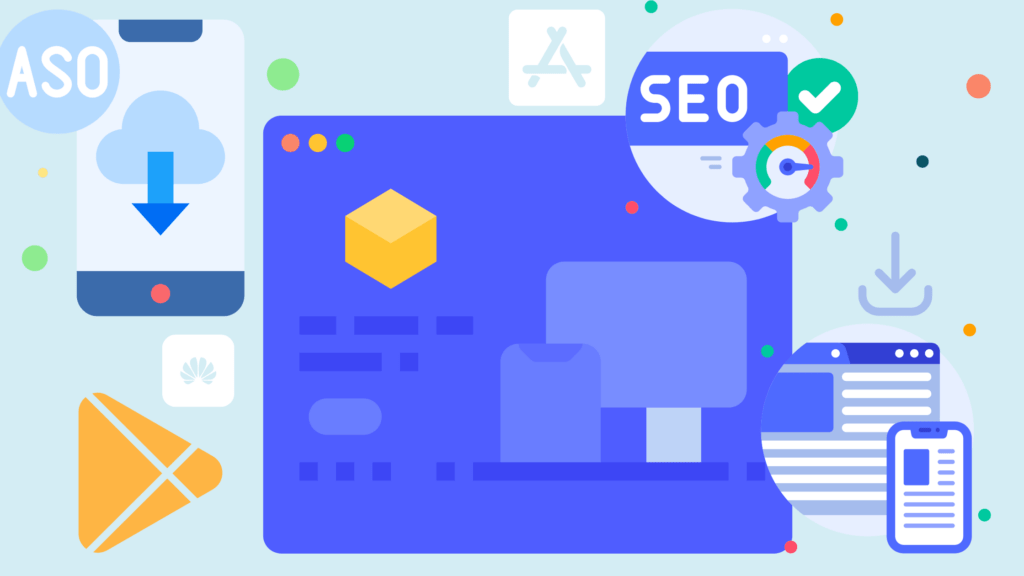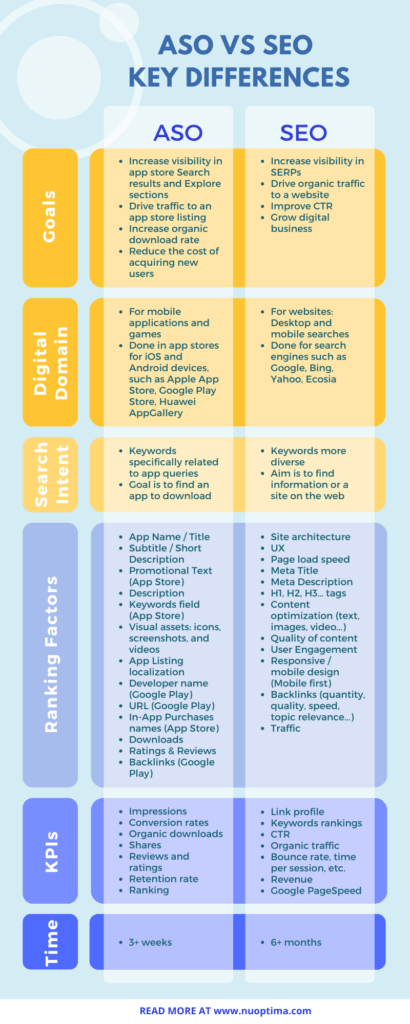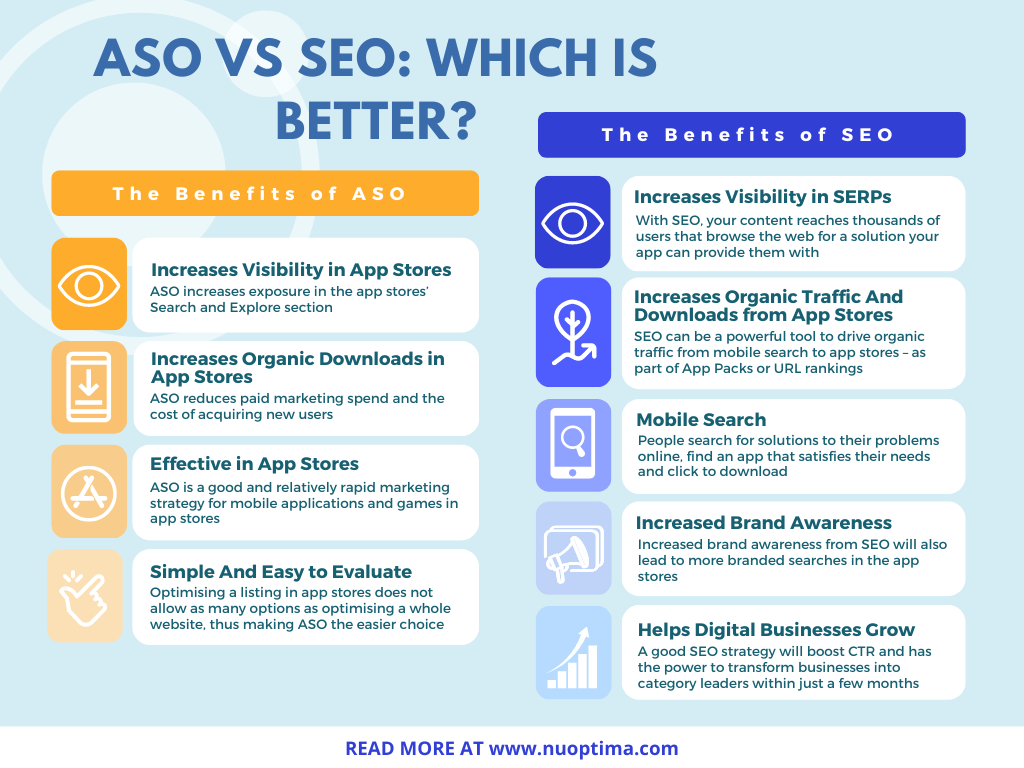
Key Points
- The main differences between SEO and ASO are their goals and digital domain. ASO, per definition, focuses on optimising an app for more visibility in app stores, while SEO focuses on website visibility in SERPs. Both serve different search intents and measure success using other ranking factors and KPIs accordingly.
- ASO and SEO both aim to drive organic traffic and rely on thorough keyword research. While ASO is an effective marketing strategy for mobile applications and games in app stores, SEO can provide a critical long-term approach to support success beyond the boundaries of the app store.
- The benefits of ASO include increased visibility, more organic downloads and lower user acquisition costs in app stores. Compared to SEO, ASO is easier for laypeople to carry out, monitor, and evaluate.
- SEO is done for desktop and mobile web searches and can increase both websites’ rankings and app downloads. The benefits of SEO include higher visibility in SERPs, more organic traffic to websites and app store listings, and increased brand awareness.
When it comes to marketing your app, you can take two main approaches – Search Engine Optimisation (SEO) and App Store Optimisation (ASO).
But you might wonder that isn’t App Store Optimisation just ‘SEO for mobile apps’? Well, no. The two are related but differ in a variety of ways.
In addition to targeting distinct audiences in online environments, SEO and ASO pursue different ends. ASO is a method that aims at improving an app’s discoverability and position in app stores, while SEO increases a website’s exposure and ranking in search engines.
In this article, we’ll walk you through some of the key differences between SEO and ASO and have a look at their similarities, too. We’ll conclude with a summary of which strategy to choose for your app. Let’s get started!
What Does ASO Mean?
App Store Optimisation, or ASO, strives to make an app easy to find in an app store’s Search and Explore sections. Common app stores include Apple App Store, Google Play Store, and Huawei AppGallery. In order to increase visibility and compel users to download your app, ASO tries to optimise its listing for a series of ranking factors set by each app store’s algorithm.
What Is SEO?
Search Engine Optimisation, or SEO, uses a combination of procedures to make a website rank higher in Search Engine Results Pages (SERPs) for specific keywords. SEO serves your website to establish relevance and authority on the web, as well as to increase organic traffic and raise conversions.

Key Differences: SEO vs ASO
Find out below which key aspects mark the difference between SEO and ASO.
Goals
An SEO-optimised website aims to fulfil visitors’ search intent. When successful, the website attracts more organic traffic, improves its ranking in SERPs, and gains authority. Thereby, SEO improves click-through rates and helps digital businesses to grow.
On the other hand, ASO’s goal is more straightforward: driving traffic to an app listing and increasing organic downloads to help reduce the cost of acquiring new users.
Digital Domain
Search engines and app stores are separate digital domains with different algorithms and ranking systems. Whereas SEO is all about optimising a website and content for search engines, ASO focuses on optimising app listings and games in app stores.
Search Intent
When it comes to web searches, a great share of people are looking for information. In marketing, this share is called top funnel traffic. These people click on informative material such as top-numbered lists and ‘how to’ articles. Their search intent is very different from that of searchers in app stores. Basically, in app stores, there’s little room for content. Thus, app stores usually attract bottom-funnel traffic primarily consisting of people ready to download an app that best serves their needs.
Ranking Factors
With billions of websites and new additions every day, the competition in SERPs is fierce. To improve a website’s ranking on search engines, three key factors need to be taken into account: Content, Backlinks, and Technical SEO. Of those three, content is the most critical factor in SEO rankings.
It is also important to highlight that SEO must use relevant keywords to describe a product or service while avoiding keyword stuffing. Simply, when it comes to the content itself, high-quality, written text is essential for SEO. Content optimisation for SEO purposes includes the following:
- Landing Pages
- Category Pages
- Redirecting Domains
- Building Backlinks
- Comparison Pages
- Product Benefits
- Product Features
On the other hand, App stores leave minimal space for text and prioritise the following as the most important assets of the app listing.:
- Screenshots
- App Preview Videos
- App Icons
Furthermore, in contrast, the Apple App Store has a dedicated keyword section that allows you to list additional keywords. And since we are on the topic, the keywords that benefit your ranking in app stores will significantly differ from those you would use on your website – partially because of different search intent and partially due to different algorithms.
Did you Know? If you’re looking for an expert to support your SEO efforts, NUOPTIMA’s team of specialists is just a call away.
Key Performance Indicators (KPIs)
To maximise performance, both SEO and ASO strategies must be tracked. However, what metrics you track differs.
To gauge your SEO success, the following need to be evaluated:
- Keywords your site ranks for (both on desktop and mobile)
- Click-Through Rate (CTR)
- Organic traffic
- Bounce Rate
- Time Per Session
- Google PageSpeed.
Similarly, tracking your ASO success with the best ASO tools ensures that your app’s listing is optimized effectively for visibility and downloads.
In order to track your ASO efforts, keep an eye on visibility metrics and KPIs that give an idea of whether your app’s listing effectively compels users to download and about its exposure, such as the following:
- Impressions
- Conversion Rate
- Organic downloads
- Shares
- Reviews
- Ratings
- Retention Rate
- Ranking
Results Timeframe
Both SEO and ASO must be done consistently. SEO deals with higher competition and is more complex. You will likely notice considerable effects after about six months into your campaign. So, be patient and give your SEO efforts a few months before beginning to analyse results and determine how to adjust the approach.
However, with ASO, you should have a good idea of how you rank a few weeks after setting up your keyword targeting.
Main Similarities of SEO and ASO
Now that we’ve established the main differences between SEO and ASO, let’s see what these strategies have in common.
Both Apps And Websites Have an URL
It is widely understood that SEO has a website and URL. But yes, apps also have an URL that gets indexed and ranked in SERPs. You need to provide this URL when listing an app in app stores. This URL helps to conduct SEO for your app if you decide so.
Strive for Organic Traffic
The main goal of both SEO and ASO is acquiring free, organic traffic – web traffic in the case of SEO and app traffic in the case of ASO. Organic traffic helps websites or apps reach the top of relevant search results and receive quality traffic that can easily convert into users or sales.
Focus On Non-Branded Search Visibility
Both SEO and ASO optimise listings or pages specifically for non-branded searches that are popular and highly relevant. Those user search queries do not yet mention a specific product, brand, or solution but have high intent.
Both Strategies Rely on Keyword Research
The strategic placement of keywords helps search algorithms find and place your website or app at the top of search results. Thus, keyword optimisation strategies rely on extensive keyword research.
Did you know? At NUOPTIMA, we use keyword clustering, rather than keyword lists, to target hundreds of keywords at once and create complete and high-quality content.
Which Is Better – ASO or SEO?
By now, you’re probably wondering which strategy to choose for your app. Both ASO and SEO are effective in their respective domain and valuable digital marketing techniques. ASO is applied in app stores; SEO is done for desktop and mobile web searches.
And while ASO can only be used to a limited extent (for apps in app stores), SEO works for websites and apps. You can use SEO to attract visitors to your website and then direct them to an app store to download. So, if you want to support the success of your app, consider SEO a genius long-term approach.
But first, let’s summarise the main benefits of each strategy:
Benefits of ASO
- Increases Visibility in App Stores. ASO increases exposure in the app stores’ Search and Explore section, thus driving more organic traffic to your app store page. Think app search engine optimisation.
- Increases Organic Downloads in App Stores. ASO aims at incentivising searchers to download an app, thereby reducing paid marketing spend and the cost of acquiring new users.
- Effective in App Stores. ASO is an effective and relatively rapid marketing strategy for mobile applications and games in app stores.
- Simple and Easy to Evaluate. Optimising a listing in app stores does not allow as many options as optimising a whole website, thus making ASO the easier choice. ASO includes changes in metadata, visuals, and text, among other things.

Benefits of SEO
- Increases Visibility in SERPs. With good SEO, your content reaches thousands of users that browse the web for information or a solution. When doing SEO for your app, you can drastically expand your visibility beyond the app stores by tailoring content to your app category. Both technical SEO vs content SEO play crucial roles in enhancing visibility, ensuring that search engines can crawl and index your site while providing valuable content that engages users.
- Increases Organic Traffic And Encourages Downloads from App Stores. High-ranking websites naturally receive more organic traffic. As marketers can’t increase website rankings through paid ads (the opposite applies to app listings), searchers tend to trust organic search engine rankings more.
- Mobile Search. SEO can be a powerful tool to drive organic traffic from mobile search to app stores – as part of App Packs or URL rankings. A survey by Google and Ipsos MediaCT revealed that 32% of surveyed users discovered new apps through mobile searches. That means they read about them online in specialised blogs and online portals before entering the app store to download.
- Increased Brand Awareness. Apart from more organic app downloads and direct installs from SERPs, increased brand awareness from SEO will also lead to more branded searches in the app stores.
- Helps Digital Businesses Grow. There’s no limit to SEO. SEO can utilise various techniques that ultimately favour business growth, such as technical SEO, SaaS technical SEO, local SEO, on-page SEO, link building, and content writing, to name a few. A good SEO strategy will boost CTR and has the power to transform businesses into category leaders within just a few months.
- Competitive Edge. Competition in app stores is fierce. You might require more than short-term app store traffic to outlast competitors within your category. Using SEO could help you develop that competitive edge over other apps.
Profit-Proven SEO Experts to Leverage Your App Success
For us at NUOPTIMA, SEO is a wise investment that compounds results over time. While ASO is an important optimisation strategy within app stores, SEO ensures you still get traffic to your app listing and downloads when you slack off your ASO efforts.
According to a study of over 7,000 websites by Hubspot, there is a clear correlation between creating high-quality content that fulfils search intent and increased traffic from ready-to-buy customers – the same goes for your app.
SEO is a critical long-term approach that can help you dominate search engine results and skyrocket your downloads in app stores. For a sleep app, we’ve increased traffic from 6,500 to 20,000 visitors per month from Google Search in just two months, and doubled traffic value in Ahrefs.
We’ve achieved this by writing and publishing 30 pages, creating 20 high-quality backlinks, and executing some technical optimisations.
If you, too, are ready to grow your app long-term, schedule a free consultation call with a member of the NUOPTIMA team today!
FAQ
ASO, or App Store Optimisation, is the process of optimising an app to increase its visibility and ranking in app stores such as the Apple App Store, Google Play Store, and Huawei AppGallery. It involves optimising the app title, description, and keywords to improve an app’s discoverability and attract more organic downloads.
No, ASO does not mean SEO. While you can use SEO to boost your app’s success, both strategies operate on different digital domains. They also work with different sets of keywords, rely on different types of content, and consequently use different KPIs to track success.
The main difference between ASO and SEO lies in their goals and digital domains. ASO optimises an app for visibility in app stores, while SEO focuses on improving a website’s visibility and ranking in search engines. Both serve different search intents and use different ranking factors and KPIs to measure success.
No. ASO and SEO are separate optimisation processes focusing on different digital domains. However, pairing the two can certainly improve the chances of an app’s overall visibility and discoverability.
An example of ASO in SEO could be optimising the title, description, and keywords for a mobile game in the Apple App Store. By using relevant keywords, improving the app’s graphics and screenshots, and ensuring the app has positive reviews, you can improve the game’s visibility and lay the foundation for more organic downloads from the app stores.



